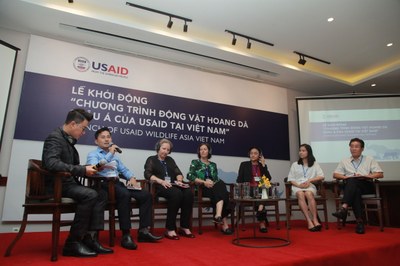USAID Promotes Chi Initiative to Drive Down Demand for Rhino Horn
“The U.S. Government remains committed to collaborating with countries around the world to combat wildlife crime and end demand for illegal wildlife products” said Craig Hart, Acting Mission Director of the U.S. Agency for International Development Mission in Vietnam.
Demand for rhino horn in Asian countries, including Vietnam, drives the illegal poaching of rhinos in Africa, putting the species in jeopardy of extinction. The Vietnamese government has made strides in countering wildlife crime, notably with a new penal code that features stricter penalties for the possession and trade of illegal wildlife products. Despite these efforts, Vietnam is still considered a major consumer market and transit hub for rhino horn.
The “Chi,” or “Strength of Will,” social marketing initiative seeks to reduce demand for rhino horn by using a social behavior change communication approach to tackle consumption driven by social status. USAID Wildlife Asia’s Chi Phase III will continue to use targeted, evidence-based behavior change communication solutions to reduce key categories of users’ demand.
“We were excited to welcome representatives from government, civil society, businesspeople and the media at the launch, which showed an increasing consensus for wildlife protection in Vietnam,” said Sarah Ferguson, head of TRAFFIC in Vietnam. “As part of USAID Wildlife Asia and with a strong commitment from Vietnamese partners, we will continue to explore innovative behavioral change solutions and work to further reduce illegal wildlife consumption in the country.”
About USAID Wildlife Asia USAID Wildlife Asia works to address wildlife trafficking as a transnational crime. The project works to reduce consumer demand for wildlife parts and products, strengthen law enforcement, enhance legal and political commitment and support regional collaboration to reduce wildlife crime in Southeast Asia, particularly Cambodia, China, Laos, Thailand and Vietnam. USAID Wildlife Asia focuses on four species: elephant, rhinoceros, tiger and pangolin. For more information, please visit www.usaidwildlifeasia.org
Presentations (can be downloaded from this link)
- Consumption of tiger products in Vietnam Initial Recommendations for Social and Behavior Change Communication, by Gayle Burgess, Behavior Change Coordinator, TRAFFIC
- Rhino Horn Consumption in Vietnam - Chi Initiative, by Trinh Nguyen, Senior Program Officer, Demand Reduction, TRAFFIC in Vietnam
Photos: USAID Asia Flickr


